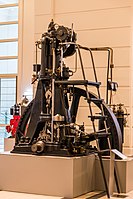
Photo from wikipedia
An experimental assessment based on combustion, heat transfer, performance and emission behavior of a 3.5 kW light duty commercial diesel engine have been executed to explore the viability of Acacia… Click to show full abstract
An experimental assessment based on combustion, heat transfer, performance and emission behavior of a 3.5 kW light duty commercial diesel engine have been executed to explore the viability of Acacia Concinna biodiesel (ACBD) (unexplored and produced from new non-edible forest feedstock) as surrogate to mineral diesel in the prevailing CI engines. The result enumerates that effect of variation in specific heat ratio as a function of in-cylinder gas temperature, on combustion heat release rate, cumulative heat release and power output is significant. Higher fraction of diffusion combustion phase with extended overall combustion duration and slightly higher heat loss per cycle was recorded for AC biodiesel fuel blends than that of diesel. The engine operation was smooth with no negative effect (except NOx emission) when fueled up to B30 (AC30D70) fuel blend compared to those of diesel.
Journal Title: Journal of Thermal Analysis and Calorimetry
Year Published: 2021
Link to full text (if available)
Share on Social Media: Sign Up to like & get
recommendations!